Cannabis Plant Anatomy 101
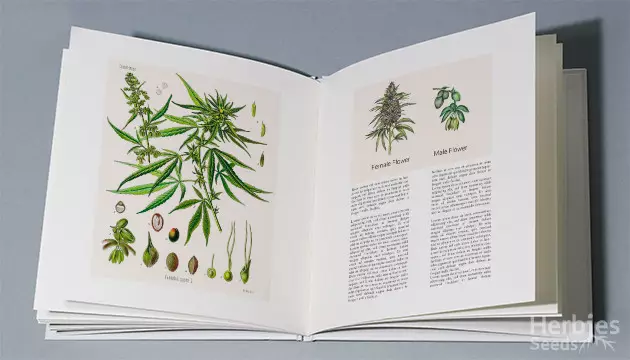
Humans have been practicing botany since ancient times, when they first began to identify plant anatomy and the difference between male and female plants. Marijuana plant anatomy is an offshoot of this study. You may be familiar with some different major plant structures such as pistils, calyxes and trichomes. However, you may not know exactly what purposes these structures serve. Luckily, we’re here to help!
Boys And Girls: Difference Between Male And Female Cannabis
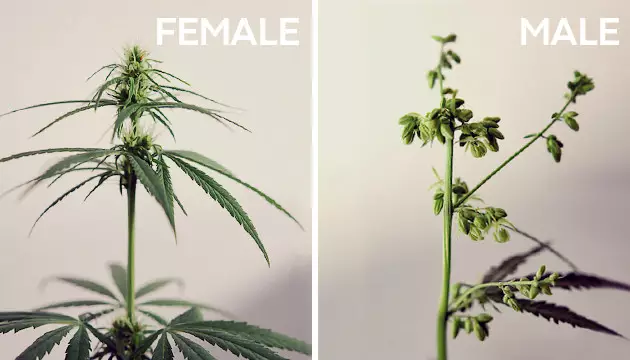
Just like with any other living creature, the main biological difference between male and female marijuana plants is their reproductive organs. For female cannabis plants, these are pistils, which grow from the spot where fan leaves meet the main stem. In addition, female plants grow flowers and produce trichomes. As a result, only female plants get you high. Male plants, in contrast, don’t form any flowers or pistils. Instead, where female pistils normally would form, they grow green pollen sacs.
Sativa Vs. Indica – Any Difference In Anatomy?
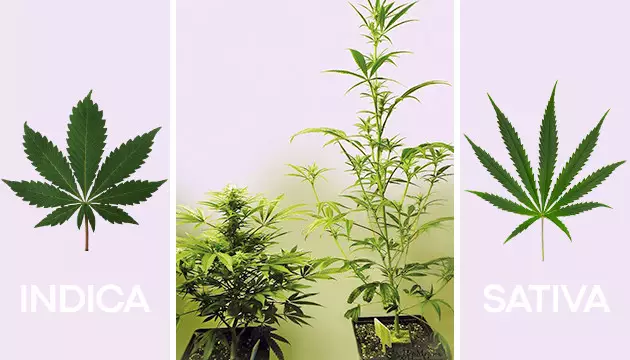
You may have heard about how smoking Indica and Sativa plants imparts two different kinds of high. However, these two plants also have different anatomies. Generally, Indica plants grow small and bushy. In addition, they also have wider leaves than their Sativa cousins. In contrast, Sativas tend to grow tall and lanky. They also tend to grow smaller nugs, and their bud sites are spread out wider along their stems than those of Indica plants.
Diving Into The Structure Of Marijuana
The parts of the marijuana plant all serve different purposes. Seeds, roots, flowers and leaves all play important parts throughout various parts of the plant’s life cycle. These structures are parts of every cannabis plant, male or female.
Seeds – It All Starts Here
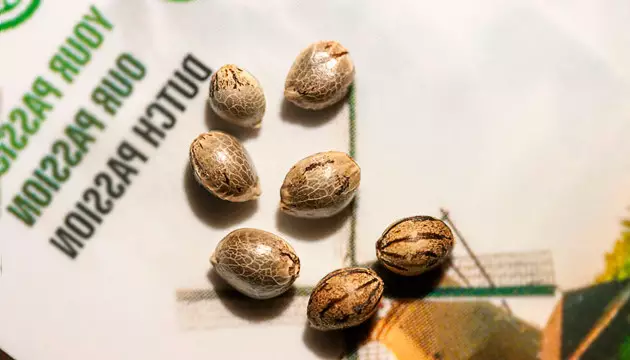
Every plant starts as a seed, and cannabis is no different. Seeds carry a plant’s genetic material and keep it safe until the conditions are right for it to germinate. Usually, there’s no way to tell whether a seed will sprout into a male or female plant until it starts flowering. However, some seeds are feminized, meaning that they’ll always sprout female plants.
Roots – Structure Absorbing Nutrients
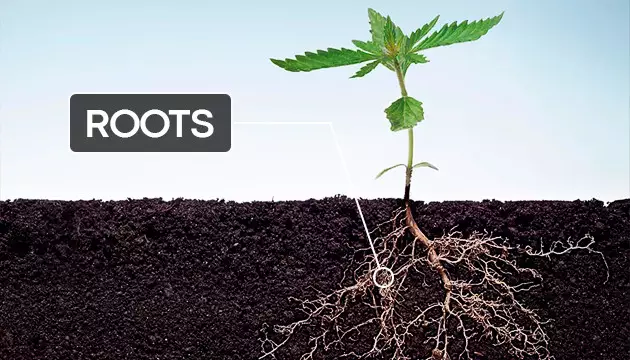
Roots serve two main purposes for the cannabis plant. First, they keep the plant firmly tethered to its growing medium. Second, roots absorb nutrients from the plant’s growing medium. Without them, plants wouldn’t be able to get the essential building blocks they need to grow. Healthy roots should appear bright white and look hairy. These “hairs” are actually new roots branching off from the main system.
Main Cola And Branches – Where The Magic Happens
Branches give plants structure and carry water and nutrients from the roots to the rest of the plant. They also sprout bud sites. Colas are large clusters of flowers that grow on the branches of a marijuana plant, from which nodes stack up tightly and sprout the biggest, densest flowers you’ll find on a cannabis plant. Without training, a plant will only have one main cola. However, a grower can train their plants to have more than one main cola using a variety of techniques like topping or FIMming.
Fan Leaves – The Plant’s Solar Panels
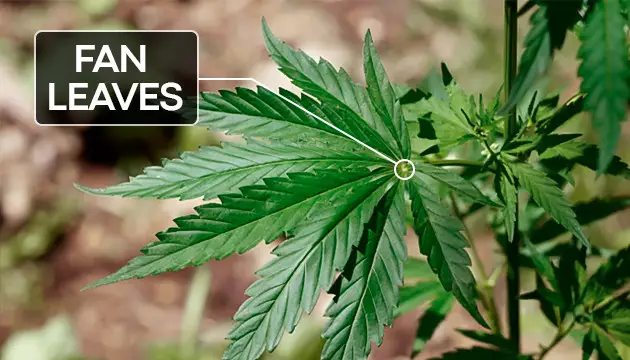
Fan leaves grow symmetrically in pairs along the stem and branches. They have their own stems that attach to the main body of the plant. Their primary job is to absorb light for photosynthesis. Once it does, an organelle within the plant’s cells combines light, CO2 and nutrients to make energy. Then, a structure called the phloem moves the energy around to other parts of the plant.
Parts Of The Cannabis Flower
Female cannabis plants develop flowers as they mature. While we use these flowers to get high, cannabis plants use them to reproduce. The stigma, pistil, bract, calyx, trichomes and resin are all crucial reproductive parts of a cannabis plant.
Stigma And Pistil
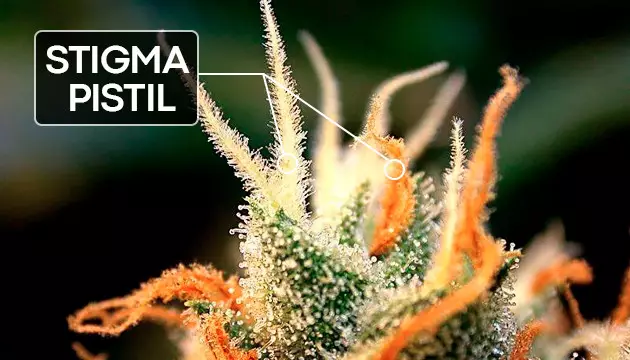
Pistils are structures that hold the reproductive parts of cannabis flowers. They’re home to an organ called the stigma, which are white, wispy strands that look like small hairs. Stigmas collect pollen from male plants – a crucial part of the reproductive process. Without them, it would be impossible for plants to share genetic information and have offspring. While the pistils of a young plant are white, they’ll turn slowly darker as the plant ages. A fully matured plant will feature red, orange or brown stigmas.
Bract And Calyx
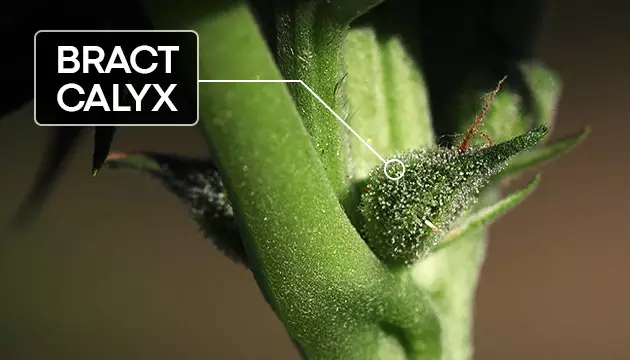
The bract, a green-hued structure that protects a female plant’s reproductive organs, is the part of the flower that gets you high. Bracts are slathered in resin and have more cannabinoids than any other part of the plant. Calyxes are another structure within the weed flower. These are green teardrop-shaped structures with small leaves packed in between them. They act as an incubator for seeds if a cannabis plant is pollinated.
Trichomes And Resin
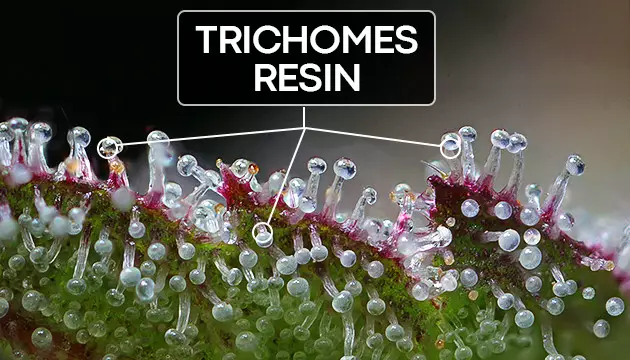
Trichomes and resin are responsible for the sticky, gooey sheath covering mature cannabis buds. Trichomes are actually individual crystals, and only form resin when they’re grouped together. While plants produce trichomes oozing with resin to protect themselves against predators, they serve a different purpose for humans. They are the part of the plant with the most powerful psychoactive effects, as the resin contains all of the terpenes, including THC and CBD.
Knowledge Of Cannabis Anatomy Is Power
While terms like “nugs” and “buds” are common in cannabis circles, many of the technical terms for plant anatomy are not. Now that you understand the scientific terms for the parts of the cannabis plant, you’ll be able to identify whenever something unusual happens to a specific structure. This knowledge, in turn, will help you grow better weed. Good luck!
Herbies Head Shop expressly refuses to support the use, production, or supply of illegal substances. For more details read our Legal Disclaimer.
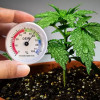

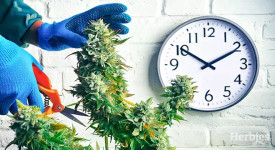
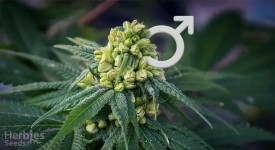
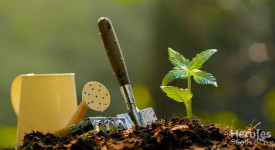
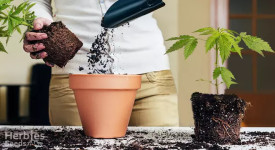
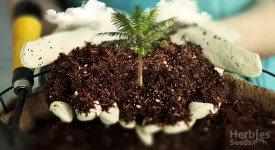
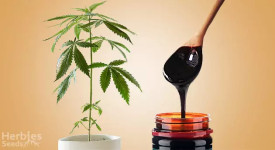
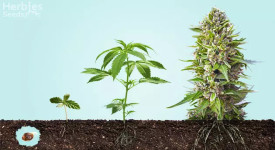
Thank you for leaving a comment for us!
Your feedback will be posted shortly after our moderator checks it.
Please note that we don’t publish reviews that: